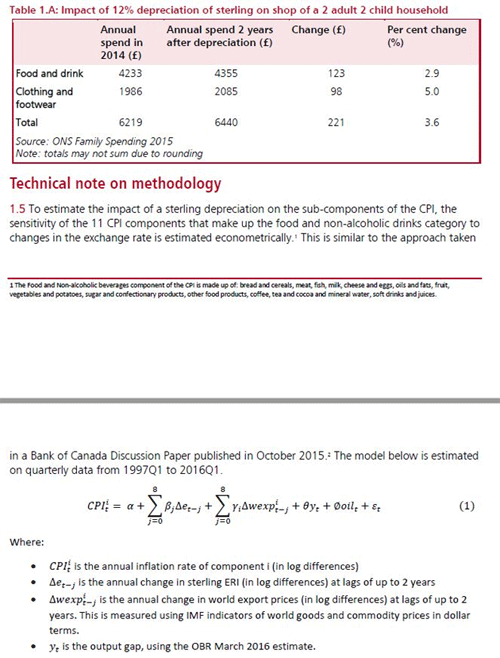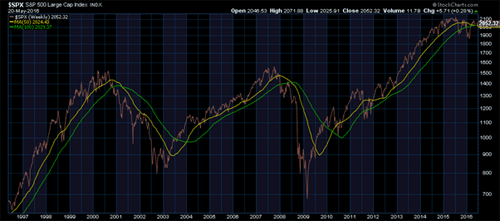It will cost you and your family £220 to leave the European Union, according to figures released today by HM Treasury. The expected cost increase is based on a projected 12% decline in sterling over two years (after Brexit), and then a rise in the cost of food, footwear and alcohol for a family of two. See how that works?

Source: HM Treasury
Clear as mud, isn’t it?
I’m not disputing that there’s maths involved. The formula, though, looks complicated – as it should when you’re calculating potential changes in consumer prices as a result of a 12% decline in sterling over two years.
But I am disputing that anyone, anywhere, knows what will happen over two years, much less two months. And that anyone can know that sterling will fall by precisely 12% over the next 24 months.
You can see my point, I hope. The “Remain” campaign is trying to reduce the Brexit argument to the pocketbook level: this isn’t about principle, or British justice, or the centralisation of power in Brussels. It’s about footwear. And the price of crisps. Or houses!
Did you miss that last week? British house prices could fall by 10-18% because of Brexit, Chancellor George Osborne claimed. You have to give Osborne credit. He’s leaving no stone unthrown in his attempt to scare Britons into staying in the EU.
The Fleet Street Letter’s Charlie Morris got Osborne’s message and sent me a note at the weekend.
Osborne warns why houses crash if we Brexit. Great. They should. They’re too high. Brexit needs to embrace the millennials. They want lower house prices yet they are statistically in the “Remain” camp.
Will the millennials vote with their hearts, their minds or their pocketbooks? A good rule of thumb in politics is that most people (including millennials) vote their pocketbook in times of economic uncertainty. It’s only when things are going swimmingly that they vote on ideals or values. This vote will tell us a lot about how the British people feel about the economy and the Tory leadership.
But markets may tell us a lot more ahead of time. In the rest of today’s brief letter I want to show you a chart. The chart shows that we’re at a crossroads in the stockmarket. But there’s a catch!
Then, a speech by the CEO of one of globalisation’s biggest backers. It reads like a eulogy for the modern world. He recommends a “bold pivot” to a more local world. But first the chart!
Markets could be on the verge of a 2001 or 2008 downturn, according to the chart above. The last two times the 50-week moving average (the yellow line) crossed below the 100-week moving average (the green line), the S&P 500 fell by over 40% both times. On Friday, the 50-week MA closed below the 200-week MA.
Now, you should know I’m not a technician. And these “death cross” technical calls are often used to write a really scary headline. But prices are signals. This could be a signal that markets are rolling over. The tide is going out on the free market of capital, goods, services, labour, and people. But there are two catches.
First, in mid-June of 2012, the 50-week MA nearly crossed the 100-week MA. Greece was headed for an election.
Grexit loomed. Doom abounded.
Then the pro-austerity party (Golden Dawn) won the Greek elections. Grexit averted! The S&P 500 rallied from 1,278 up to 2,000 – a gain of 56%. Could the same happen now? Could a near miss on Brexit lead to a big rally in global stocks?
Well, it’s the universe. Anything could happen. But the second catch is that this signal is a lagging indicator. The stockmarket is supposed to look ahead, of course, discounting the present value of future earnings. But a long-term moving average is an aggregate price that takes time to signal back to you. That’s why the “death cross” above always come after a market peak.
If it’s confusing, think of it this way: only the very perceptive realise how bad things are going to be. Most people don’t see it until it starts to get bad around them. And then the price action becomes self-fulfilling. In a bear market, ordinary people sell stocks because they are falling (just as they buy them because they are rising in a bull market).
I say “ordinary people” because investors are not supposed to behave like ordinary people. They’re supposed to “be fearful when others are greedy, and be greedy when others are fearful.” Investors pay attention to value, not price.

Category: Brexit


